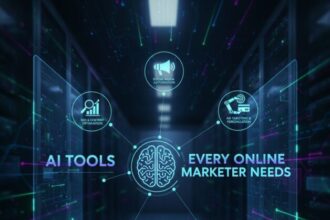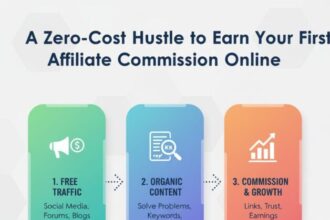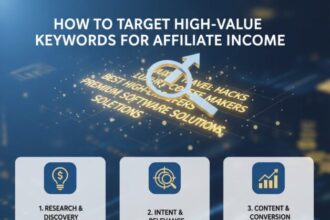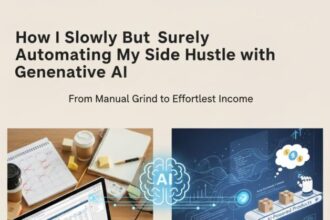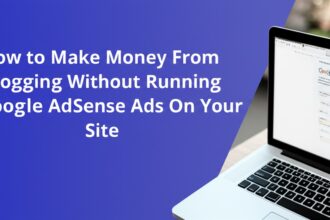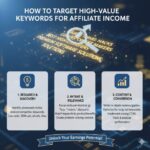I Was Broke and Stressed. Here Are The Top 3 Skills to Learn in 6 Months to Boost Your Income.
The spreadsheet was looking at me. I swear to god, it was.
It wasn’t angry, you know. Just… smug. A grid of little boxes, each one a tiny, silent judgment on my life choices. The “money in” column was a sad little trickle. The “money out” column was a raging river.
And I felt it. That hot, prickly feeling behind my eyes. The feeling you get when you realize you’re running as fast as you can, but the hamster wheel is also on fire.
I just needed more. Not lottery money. Not yacht money. Just… breathing room. Enough to stop having a mini heart attack every time I had to buy groceries.
So, I did what any modern human does when they’re desperate. I opened a new tab. And for a week, I fell down a deep, dark, and incredibly confusing rabbit hole. My mission was simple, if not a little pathetic. I was frantically searching for the top 3 skills to learn in 6 months to boost your income.
What I found was… well, it was a lot. A mountain of noise, an ocean of bad advice, and a few little nuggets of what I think might actually be truth.
Look, I am not an expert. This is not an expert’s guide. This is a map of the rabbit hole. It’s a messy, rambling story from someone who was just as lost as you might be feeling right now. I’m just laying out what I found, hoping it might save you some time.
And a few anxiety-fueled nights.
My Descent into the Madness of “Upskilling”
My journey started with that one simple search. And that one search opened a Pandora’s box of internet insanity that basically consumed my life for the next seven days.
Everywhere I looked, a new YouTube guru was standing in front of a rented Lamborghini, screaming at me about his “one weird trick.” Every blog post had a headline that promised a life-changing secret. It was a dizzying, nauseating mix of real advice, terrible advice, and things that were probably illegal in several countries.
I was looking for real, actual high-income skills. Instead, I found a million and one “get rich quick” fantasies that all seemed to involve dropshipping things from China, day trading with my rent money, or somehow becoming a famous TikTok star overnight.
No, thank you.
It felt like walking into a supermarket where every single cereal box has flashing lights and is screaming your name. It’s paralyzing. You get so overwhelmed by the sheer number of choices that you just shut down completely. You want to just turn around, walk out, and go eat toast.
I felt like that for a week straight. I had a notebook filled with scribbled, contradictory notes and a growing, sinking feeling that this was all just a colossal waste of my time.
My “Learn Everything at Once” Phase Was a Spectacular Failure
My first big mistake was born of pure desperation. I tried to learn everything. All at once.
One day, I’d be watching a three-hour tutorial on Python programming, feeling my brain slowly leak out of my ears. The next day, I’d be convinced that Amazon FBA was my ticket to freedom, watching videos about sourcing products. The day after that? I was absolutely certain I was going to become a world-class graphic designer using nothing but Canva.
It was a disaster.
I ended up with about fifteen different free trial accounts for software I didn’t understand, and approximately zero actual, usable knowledge. I was a collector of information, not a builder of skills. It was like trying to build a car by buying one spark plug, one tire, a single windshield wiper, and a car freshener. You don’t have a car. You just have a pile of junk.
And this didn’t just not work; it actively made me feel worse. It reinforced that little voice in my head that said I was the problem, that I was just incapable of learning this stuff. Which, as it turns out, wasn’t true at all. The problem wasn’t me. It was my method.
Or lack thereof.
The Kitchen Analogy That Snapped Me Out of It
The first real breakthrough didn’t come from a guru. It came while I was standing in my kitchen, staring blankly at a cupboard full of spices, feeling completely defeated.
I was thinking about how I could follow a recipe and make a decent meal. I don’t just throw random spices in a pan and hope for the best. That would be disgusting.
No. I pick a recipe first. I decide on the end goal—the finished dish. A chili, maybe. And only then do I start grabbing the specific ingredients I need. The chili powder, the cumin, the onions. In a specific order.
And it hit me. So hard it was almost comical.
All those side hustle ideas I was chasing? They were just random spices on a shelf. I didn’t have a recipe. I had no idea what I was trying to cook.
I realized, right there in my kitchen, that I had to stop looking for “skills” in a vacuum. I had to pick a destination first. I had to decide on a “job” or a “service” I could actually see myself doing, and then work backward from there to figure out the handful of skills I would need to do it.
It sounds so simple, but it was a revelation. It was permission to ignore 99% of the noise. It was permission to just focus on finding one single recipe I actually wanted to make.
Fighting the Annoying Voice in My Head That Said I Couldn’t Do It
Okay, so I had my “recipe” mindset. That helped. A lot. But there was still this other problem. A little voice in my head that was constantly telling me I was going to fail.
I had to actively fight that voice. I had to debunk its favorite arguments, one by one.
The “You’re Not a Genius” Lie
This was my brain’s go-to argument. I’d look at things like coding or data analysis and my mind would just shut down. “Nope,” it would say. “That’s for the smart kids. The math whizzes. The prodigies. You’re not one of them.”
I really believed that for a long time. I thought people who were good at valuable, technical skills were just built differently.
But the more I actually looked into it, the more I realized that’s just not true anymore. Not really. For almost every complex skill out there, there are now incredible tools and platforms that do most of the heavy lifting for you. You don’t need to be a coding genius to build a professional website. You don’t need to be a data scientist to analyze a spreadsheet.
The barrier to entry has been lowered so much. It’s less about some innate genius and way more about just having the patience to watch a few YouTube tutorials and follow a process. That was a huge mental block I had to bulldoze.
The “You Need a Ton of Money to Even Start” Myth
This is a classic excuse. “You need money to make money.” And yeah, if you’re trying to open a factory, sure.
But for the world of learning new skills online? It’s the great equalizer. It really is.
You can learn pretty much anything you want, from the absolute basics to a surprisingly advanced level, for free. Or at least, very, very cheaply. YouTube is the greatest free university ever created. Then you’ve got places like Coursera, HubSpot Academy, and Google’s own Skillshop. The sheer volume of high-quality, free education available right now is mind-boggling.
Sure, you can pay thousands for a fancy online bootcamp. And maybe it’s worth it. But the idea that you have to spend a fortune just to get your foot in the door is a complete myth. The only real investment you have to make is your time and your focus.
The “You’re Too Old for This” Trap
Oof. This one is a sneaky, quiet killer. It’s that little whisper that says, “Is it too late to learn a new skill?“
It’s the voice that tells you that you should have learned this stuff in college. That you’re too old, too set in your ways. That the world is full of bright-eyed 22-year-olds who are already light-years ahead of you.
It’s a powerful fear. But it’s also a logical trap.
The world is changing so ridiculously fast that skills are becoming obsolete all the time. The person who learned a specific type of coding ten years ago might actually be at a disadvantage now, because they’re clinging to outdated methods.
I stumbled across this article from the Harvard Business Review, and it wasn’t some guru, it was actual researchers. And they talked about how “lifelong learning” is no longer a buzzword; it’s the single most important survival skill in the modern economy. It’s not about what you know. It’s about how fast you can learn something new.
Being a beginner isn’t a weakness. It’s a superpower. You get to learn the most current tools and the most modern techniques, all without the baggage of “the way we used to do it.” You are a blank slate. And that’s a huge advantage.
The One Idea That Flipped the Switch in My Brain
So, I was feeling better. I was fighting my own brain and winning. I had my “recipe” analogy. But there was still a piece missing. I was starting to get how to learn, but I was still fuzzy on how you turn that learning into actual, you know, money.
And then it hit me. The “aha!” moment. The key that unlocked the whole puzzle.
It wasn’t a skill. It wasn’t a secret website. It was just a simple, powerful shift in how I was looking at the entire problem.
I Was Collecting Hammers, Not Building Houses
For the longest time, I saw skills as things you collect. Like little merit badges. “I learned how to use Excel!” Bing. “I learned the basics of Photoshop!” Bing.
I had this fuzzy, half-baked idea that if I just collected enough of these skill-badges, a magical job fairy would appear and shower me with money.
Well… nope.
That’s not how it works. Knowing how to use Photoshop is a skill. But it’s just a tool. It’s like knowing how to use a hammer. By itself, that knowledge is pretty much worthless.
But knowing how to use that hammer to build a beautiful, sturdy, custom birdhouse for a woman who adores blue jays and is willing to pay for quality? That is what’s valuable.
From “What Can I Learn?” to “What Problem Can I Solve?”
My breakthrough was realizing this one simple truth: Nobody pays you for your skills.
Nobody.
They pay you to solve their problems. They pay for an outcome. They pay for the birdhouse, not your ability to swing a hammer.
The real goal isn’t to learn a skill. The real goal is to learn how to apply a skill to solve a specific problem for a specific group of people. This is the whole secret. This is the practical application of skills.
This one shift changed my entire universe. I stopped asking, “What skills are hot right now?” and I started asking, “What are some annoying, persistent problems that businesses and people are willing to pay money to make go away?”
And then, I asked, “Okay, what’s the absolute minimum set of skills I need to learn to be able to solve that one problem?”
Suddenly, the path wasn’t a confusing, foggy mess anymore. It was a straight line. Pick a problem, learn the solution, find people with the problem. It made it all feel so much more possible. It reminded me of the stuff I wrote about in my post on how to finally get over your fear of starting. It’s all about focusing on the end result.
Okay, So What Did I Actually Do? My Unofficial Guide
So, this is it. The meat and potatoes. After all the chaos and confusion, this is where I landed. I focused on three specific “recipes.” Three problem-solving packages that I genuinely believe a normal, non-genius human could learn the fundamentals of in six months.
This is my list. Yours might be different. But if you’re feeling lost, this is a damn good place to start. And this is my personal take on the top 3 skills to learn in 6 months to boost your income.
Recipe 1: Become a “Digital Landscaper” (No-Code Web Development)
The Problem You’re Solving:
Millions of small businesses, artists, freelancers, and restaurants have websites that are ugly, broken, or just plain embarrassing. They are losing customers because of it. They can’t afford a big, fancy web design agency, and the thought of learning to code gives them hives. They need a clean, professional online home. Now.
My Journey With It: I used to think “building a website” meant locking myself in a dark room with a case of Red Bull and learning five different programming languages. The thought alone was exhausting. But then I found the no-code world.
Platforms like Webflow and Bubble have changed everything. They are visual. It’s more like designing a presentation than writing code. It’s intuitive. I spent a solid month just following free tutorials on YouTube, and I was shocked to find that it was actually… really fun?
The 6-Month Plan, My Way:
Months 1-2: Marry One Platform. Pick one. Just one. I’d suggest Webflow. It’s the sweet spot between power and usability. For two months, do nothing but live inside their free “Webflow University.” It’s an incredible resource. Your only goal is to be able to confidently build a clean, 5-page business website from a template.
Months 3-4: Start Building a Portfolio from Scratch. This is the most important part. You need proof you can build the birdhouse. So you build a few fake ones. Invent a local coffee shop and build it a gorgeous website. Then, invent a freelance photographer and build them a stunning gallery site. These projects are now your resume. They are everything.
Months 5-6: Become a Helpful Hunter. Don’t just apply for jobs. Go find ugly websites. Find a local restaurant you love whose website looks like it was made in 1998. Build them a simple, beautiful one-page new design. Then, send them an email. “Hey, I’m a local web designer and a huge fan of your food. I was playing around and built this little one-page refresh of your site, just for fun. No strings attached. Here’s the link.” You’re not asking for anything. You’re giving them a gift. A gift that shows them exactly how you can solve their problem.
Recipe 2: Become a “Digital Tour Guide” (Content Marketing & Basic SEO)
The Problem You’re Solving: Businesses need to be found on Google. Period. When someone searches for “best pizza near me,” a pizza shop needs to show up. But most business owners are not writers. They don’t have the time or the skill to create helpful blog posts, articles, and guides that answer their customers’ questions. They need someone to be their guide, to create the content that brings people to their digital door.
My Journey With It: I’ve always liked writing, so this felt like a natural fit. But I learned fast that just writing pretty sentences is worthless if no one ever reads them. I had to learn the basics of SEO (Search Engine Optimization).
And it wasn’t as scary as it sounds. I didn’t become a tech wizard. I just used the free blogs and YouTube channels from places like Ahrefs and HubSpot to learn the fundamentals. It’s not about tricking Google. It’s about being a detective. It’s about figuring out what questions people are really asking, and then creating the absolute best, most helpful answer to that question on the entire internet.
The 6-Month Plan, My Way:
Month 1: The Brain Dump. For one month, just read. Binge the Ahrefs blog. Watch the HubSpot Academy videos on content marketing. Your goal isn’t to memorize everything. It’s just to understand the language. What’s a keyword? What’s a headline? How do you structure a post so it’s easy to read?
Months 2-4: Build Your Own Thing. You need to prove you can do it. So you do it. For yourself. Pick a topic you genuinely love—could be vintage synthesizers, could be growing tomatoes, whatever. Start a dead-simple blog. And then write five of the most helpful, detailed, amazing articles on that topic that have ever been written. This blog is now your portfolio. It’s living proof.
Months 5-6: Get Your First Few Wins. Now you can dip your toe into freelance platforms for beginners. Yes, I’m talking about sites like Upwork. They can be a grind, but they are great for one thing: getting your first few paid gigs. Create a profile that links directly to your five amazing articles. Apply for small, entry-level writing jobs. Your goal isn’t to get rich on Upwork. Your goal is to get 3-5 positive reviews and paid projects. Those are your golden tickets to then start pitching better clients directly.
Recipe 3: Become a “Digital Magician” (Short-Form Video Editing)
The Problem You’re Solving: Scroll through TikTok or Instagram for five minutes. What do you see? Video. Tons of it. Businesses, creators, and brands are desperate for short, snappy, eye-catching videos. They often have the raw footage, but they have no idea how to turn their boring 3-minute clip into a 30-second video that people will actually watch. They need a magician.
My Journey With It: I always thought video editing was for Hollywood pros with supercomputers. It’s not. The software has gotten insane. I downloaded DaVinci Resolve—the free version is ridiculously powerful—and just started messing around.
I’m not going to lie, the learning curve was a bit steeper here. But I just followed tutorials on YouTube. I learned how to cut clips to the beat of a song. I learned how to add those cool, dynamic captions everyone uses. Seeing my own boring phone footage transform into something that looked… cool? It was addictive. It felt like learning a magic trick. It’s like I talk about in my post on low cost hustling; the right software can feel like a superpower.
The 6-Month Plan, My Way:
Months 1-3: Live in the Software. This one takes more time. Pick one tool. DaVinci Resolve or CapCut. For three months, your only goal is to master the fundamentals. How to make clean cuts. How to sync clips to music. How to add simple text and titles. How to find and use royalty-free sound effects. That’s it.
Months 4-5: Build Your “Magic Trick” Portfolio. Don’t wait for clients. Go find boring videos. Seriously. Find 5-10 ads or talking-head videos on Instagram or TikTok that are just plain dull. Download them. And then work your magic. Re-edit them. Make them short, punchy, and exciting. Create a simple “before and after” reel. This is the most powerful portfolio you can possibly have. It literally shows the transformation you can create.
Month 6: The “Free Sample” Pitch. Now you hunt. Find 20 creators or small businesses you like whose video game is weak. Send them a real, human DM. Not a spammy one. “Hey, I’m a huge fan of what you do. I’m a new video editor, and just for fun, I re-edited one of your recent videos to give it a little more energy. No strings attached at all, just wanted to show you what I saw. Here’s a link.” You’re giving them a free taste of your magic. It’s the most powerful sales pitch there is.
So, Am I Rich Now? (Spoiler Alert: No.)
It’s been a ride. A long, weird, stressful, and ultimately… amazing six months.
And no, I’m not rich. I haven’t bought a boat. I haven’t “retired to a beach in Thailand.”
But that spreadsheet? The Budget of Doom? It doesn’t look so smug anymore.
There are a few more lines in the “money in” column now. And they’re lines that I put there. I made them happen. With skills I didn’t have a year ago.
But honestly? More important than the money is the feeling. That feeling of being powerless and overwhelmed is gone. It’s been replaced by a quiet, sturdy confidence. A sense of control. I know, deep in my bones now, that if I need to, I can learn how to solve problems. And that is a skill that will never, ever be worthless.
The world is still a crazy place. But I don’t feel like I’m just getting tossed around by the waves anymore.
It feels like I finally have my hands on the rudder.
So, I guess the only question left is: what’s the first recipe you’re going to try?
